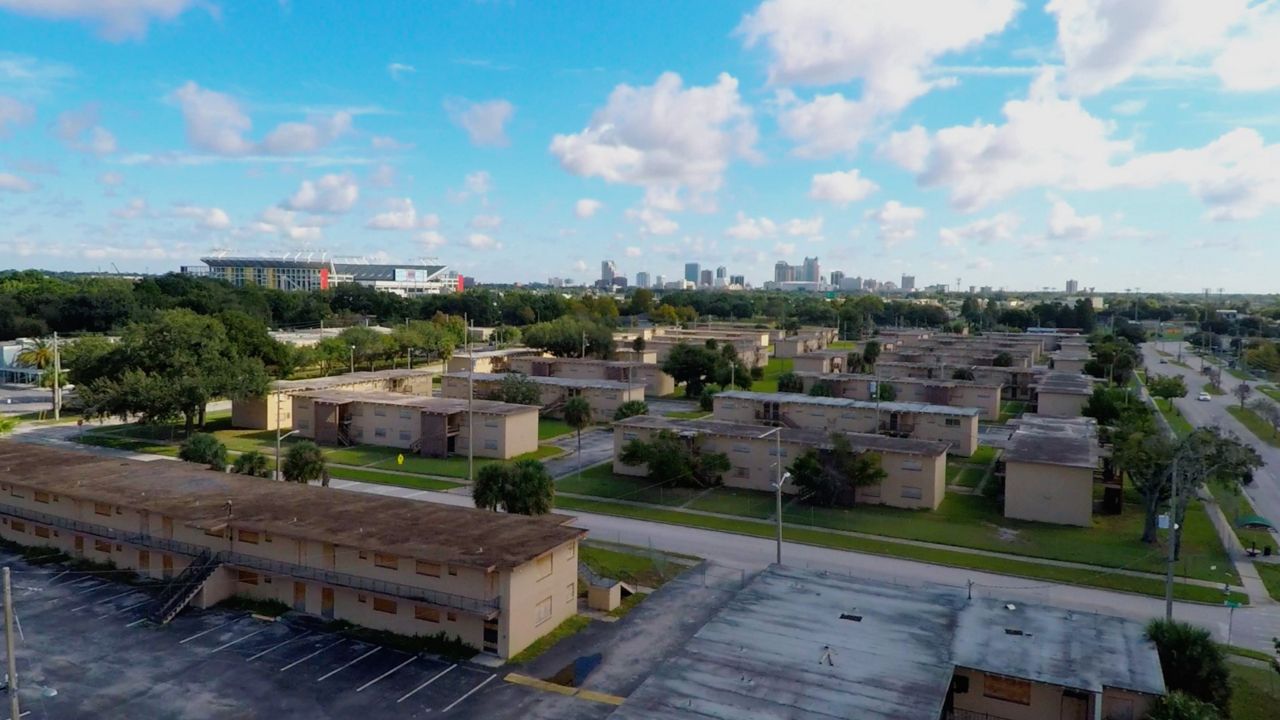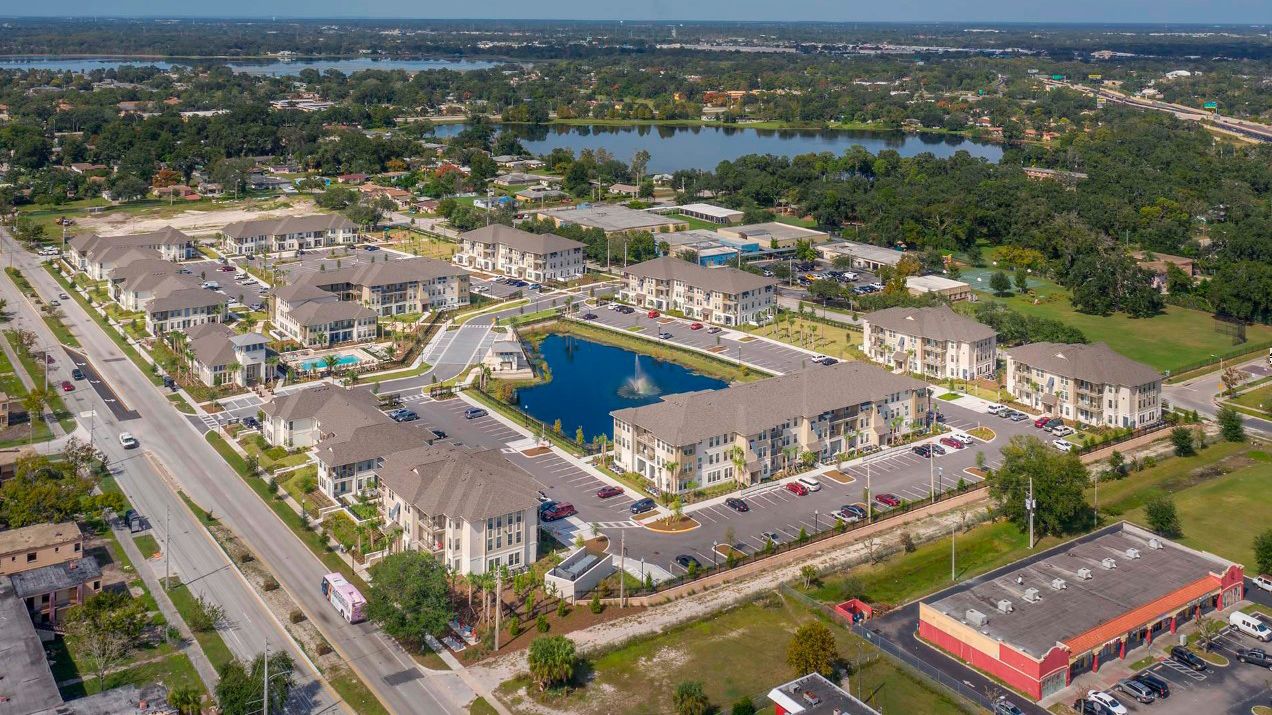ORLANDO, Fla. – When Lift Orlando first opened Pendana at West Lakes a few years ago, demand was incredibly high, with more than 10,000 applicants in line for just 200 apartment units.
Latasha Ross, one of the first in line, managed to secure a unit for herself and her two children.
“The community is excellent,” Ross said. She loves the sprawling grounds and the community’s central location; both her kids can walk to school. In partnership with Goodwill Industries of Central Florida, Lift Orlando also provides some baked-in support for community residents who want to learn about transitioning into homeownership.
That’s Ross’s next goal: owning a home.
“You have a house, you can do all the things you want to do,” Ross said. For her, that means backyard barbecues, loud music and lots of wall space, for the colorful photo collages she’s made with images of family members and beloved memories.
Some of those memories are bittersweet. There’s a photo of Ross at a fundraiser for breast cancer research shortly after her own hair started to grow back following chemotherapy.
Initially diagnosed with breast cancer in 2016, Ross says she’s since recovered – but she’ll go to doctor’s appointments and treatments for the rest of her life.
“It’s very hard … it’s part of my everyday life,” Ross said. “But I just told myself: I gotta fight for my kids.”
Now, that’s exactly her mentality when it comes to housing, too.
“I told my kids: Mommy’s not gonna stop,” Ross said. “Our goal is to get a house.”
Breaking cycles of concentrated poverty with mixed-income housing
The so-called “American Dream” of homeownership hasn’t ever been equally accessible to everyone. But the pandemic era’s inflated housing market has clarified just how disproportionately uneven the odds are for many marginalized groups.
The gap in homeownership rates between Black and white families is about as wide as 120 years ago, according to the National Community Reinvestment Coalition. The nonprofit wants to see the average Black homeownership rate rise to 60% over the next twenty years; right now it’s at about 43%, way lower than white homeowners’ 72%.
Black women, though, appear to be making strides: together with millennials, they’re driving the Black homeownership rate overall, outpacing men consistently for at least the last three years. Although Ross just renewed her lease at Pendana, she hopes by this time next year, she’ll own a home – ideally one nearby, in the same Community of West Lakes area that’s made up of five historically Black Orlando neighborhoods.
Pendana replaced the formerly-dilapidated Washington Shores Village apartments on Orange Center Boulevard, which were torn down in 2016. For the community partners who came together to bring Pendana to life, Lift Orlando president Eddy Moratin says, the goal was to help residents regain their “sense of pride, of place and belonging” to the West Lakes area.

Before the dilapidated Washington Shores Apartments were razed. Photo credit: Lift Orlando

The new Pendana at West Lakes. Photo credit: Talking Head Studio
“There was a sense of connection to this place,” Moratin said, explaining that 65 percent of Pendana’s initial residents said they or their families had a personal history of living in the area. The idea, then, was to ensure the West Lakes neighborhoods remain somewhere people want to live – regardless of income level.
“Mixed-income housing is intended to create a place that attracts families to want to stay in the neighborhood as their income grows,” Moratin said. It’s why Pendana units are intentionally set at different price points, with a range of market-rate and income-restricted apartments.
“If you really want to help people get integrated into opportunity, mixed-income housing helps folks not be isolated in concentrated poverty, not be disconnected from the networks that open doors of opportunity for all of us, but find themselves getting to know folks of different places in life, different levels of education and income,” Moratin said.
That diversity makes for a healthy community, Moratin says – and Ross agrees, saying it’s nice meeting different neighbors, from doctors to police officers. Moratin hopes the community will just keep thriving, once the Heart of West Lakes Wellness Center officially opens later this year.
Our zip codes can predict our life outcomes
The soon-to-be holistic wellness center will address a key aspect of Lift Orlando’s mission: the knowledge that so much of our success in life depends on where we’re born and grow up. In every major market, Moratin says, distressed people in certain zip codes aren’t living the “American Dream” – and that’s not coincidental.
“Certain zip codes, certain neighborhoods have not had equal access to opportunity, to investment, to open doors – to be able to prosper in the way that America knows how to make people prosper,” Moratin said. “You play the tape forward on that for enough years and you end up with a vacuum of investment, of infrastructure, of opportunities.”
With The Opportunity Atlas, an interactive data tool from Harvard researchers and the Census Bureau, users can see the impact of zip code on different life outcomes, including education levels and incarceration rates.
Decades of disinvestment in predominantly-Black neighborhoods, including West Lakes’ 32805 zip code, has turned upward mobility into a Herculean effort for many residents – but it doesn’t have to be that way, Moratin says.
With onsite resources ranging from health care to financial counseling, the Heart of West Lakes Wellness Center will help residents “to really embrace the dreams and hopes that you have, and not have to leave the neighborhood to find those resources – because they’re baked right in, and designed and tailored for you,” Moratin said.
It’s the kind of support he says will help residents like Ross strive for and reach their personal goals, including homeownership – right here in the neighborhoods of West Lakes.
“That idea of building a community where people who live in the apartments have the same pride and dignity as the folks who own homes across the street – that’s what makes it something sustainable,” Moratin said.



